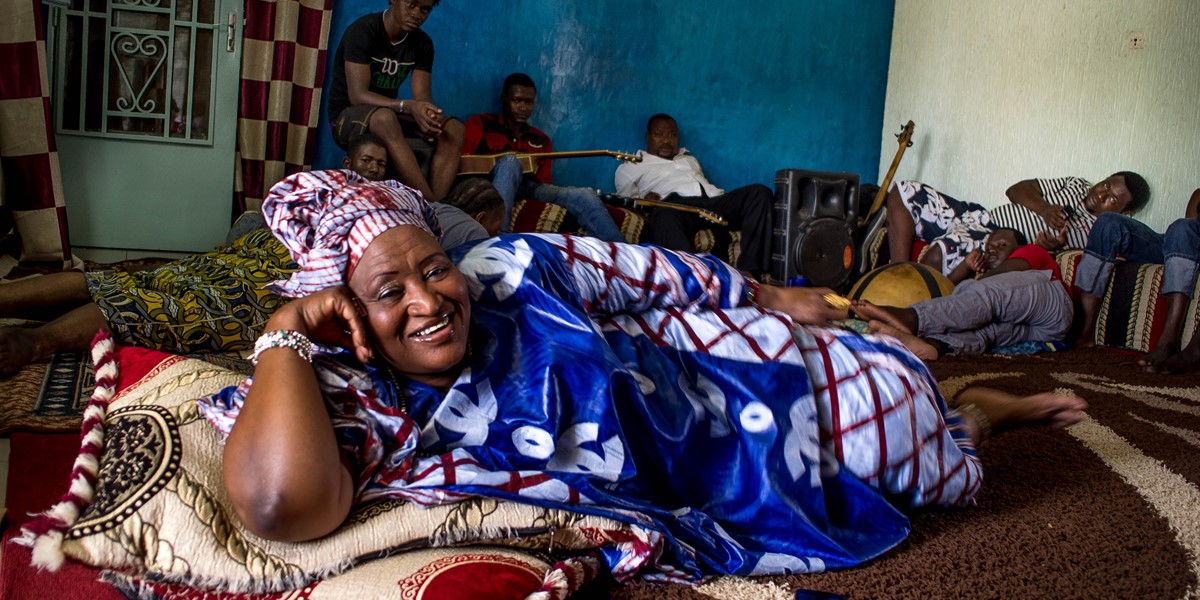Tuesday, September 4, 2018
Remembering Malian singer Khaira Arby – the 'Nightingale of Timbuktu'
By Andy Morgan
Malian singer Khaira Arby, known as the 'Nightingale of Timbuktu' died August 19. Andy Morgan pays tribute to her exceptional life and career.

Khaira Arby in Bamako, 2014 ©Andy Morgan
The ‘Nightingale of Timbuktu,’ ‘Diva of the North,’ ‘Dove of the Deserts’ – none of the habitual epithets manage to encompass the talent and personality of Khaira Arby, who passed away in Bamako on August 19th following a stroke. Apart from being one of the greatest Malian singers of modern times, she was also a cultural activist, an advocate for peace, a loving mother and indomitable defender of women’s rights.
Khaira Arby was born in 1959 in the historic Abaradjo district of Timbuktu, where, for centuries, the trans-Saharan caravans made camp after their long trek across the desert. Her ethnic make-up – part Arab, part Songhai, part Tamashek – was complex, a fact that underpinned her life-long devotion to ethnic tolerance and multi-culturalism. She fell in love with music from the earliest age and first appeared on stage in Timbuktu at the age of 11, as part of the Biennales – Mali’s government-sponsored cultural competitions designed to foster national unity and pride in African heritage. That first year she made it as far as the finals in Bamako and went on to perform at the finals of every single Biennale over the next two decades.
But her father objected to her dreams of becoming a professional musician, a role that was almost unheard of for women from the north of the country at the time. He tried marrying her off in 1976, to a man equally horrified by her musical ambitions. The marriage ended in divorce in 1983, and Khaira went back home to Abarajo where she managed a local cultural troupe for a while before eventually returning to the stage.
In the late 1980s, Khaira moved to Bamako and became a member of the legendary National Badema orchestra. She was the first woman from northern Mali to release a solo cassette, with the appearance of Moulaye in 1990, an album filled with messages of peace to counteract the violence that had just then been unleashed by a new Touareg rebellion. Her next two cassette releases, Hala (1993) and Ya Rassoul (2002), solidified her national fame and popularity. In 2009, she became a Chevalier de l’Ordre National du Mali.
After jihadist militias took control of Timbuktu in late March 2012, a group of three mujahedeen came to Khaira’s studio and threatened to cut out her tongue if she continued to sing. They then destroyed all her equipment. Khaira was forced to flee to Bamako where she lived with her immediate family until she passed away.
Khaira was a passionate defender of Malian unity, believing that a proud ethnic identity could happily co-exist with a proud national one. She also believed that playing music was entirely compatible with her devotion to Islam. In 2012, she helped Fatoumata Diawara to organise the recording of Mali-Ko, a song for peace featuring almost all of Mali’s musical greats. Two years later she was awarded a Tamani d’Or, Mali’s equivalent to the Grammies.
Despite releasing two critically acclaimed international albums (Timbuktu Tarab in 2010 and Gossip in 2015) and despite her collaborations with Brooklynites The Sway Machinery, JeConte, Ali Farka Touré and Bassekou Kouyaté, her extensive tours of the US and Europe, and her prestigious appearances at the Festival in the Desert, Khaira Arby’s international career never quite achieved its fullest promise, a great regret for the many fans who didn’t manage to see one of her captivating live shows.
Her starring role in the feature documentary film They Will Have to Kill Us First, with its moving scenes of the concert she organised in the streets of her birthplace Abaradjo, the first concert to take place in Timbuktu since the end of the jihadist occupation, offer an enticing taste of her immense power and authority as a singer and a performer. Her passing, just short of her 60th birthday, is a tragedy for all fans of Malian and Saharan music. May the earth rest light upon her.

